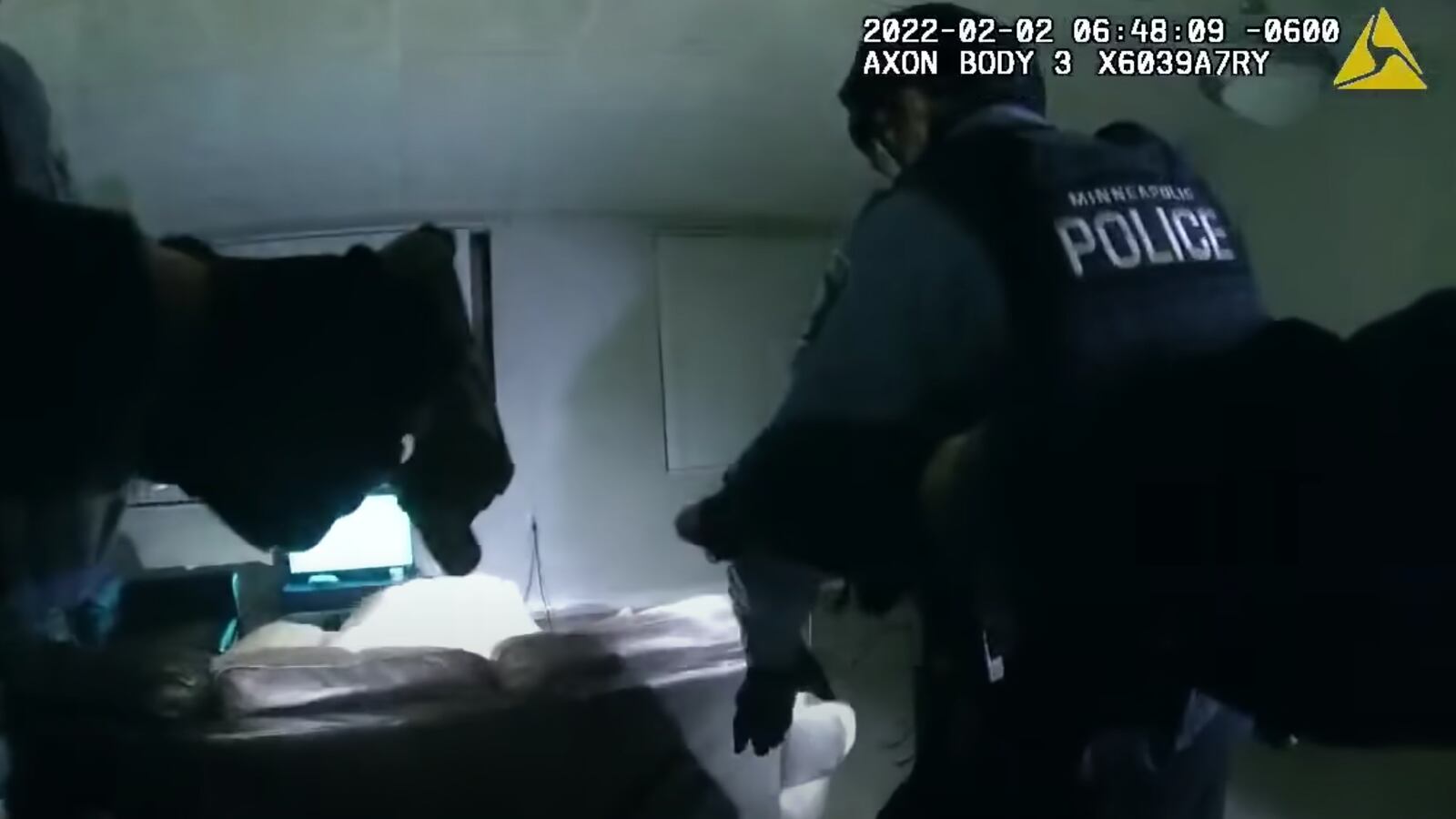Before 22-year-old Amir Locke was killed by a SWAT team as he slept in a friend’s Minneapolis apartment, cops convinced a judge to grant them a “no-knock” search warrant for their raid by claiming it would actually be safer.
That’s according to newly released court documents provided to The Daily Beast by Minnesota’s Fourth Judicial District, which claim the no-knock warrant would “not only increase officer safety, but…also decrease the risk for injuries to the suspects and other residents nearby.”
The documents further insist that a “nighttime search outside the hours of 7 a.m. to 8 p.m. is necessary to prevent the loss, destruction or removal of the objects of the search or to protect the searchers or the public.”
But things didn’t turn out as advertised. Police shot Locke, a Black man who was armed with a handgun his family says he possessed legally, in a pre-dawn raid on Feb. 2. Bodycam video of the deadly incident shows officers used a key to open the apartment door while shouting, “Police, search warrant, get on the ground, get on the fucking ground!” One of the officers then kicked the sofa where Locke was sleeping, rousing him as he held a gun in his hand. In the blink of an eye, cops opened fire, fatally shooting Locke—who was not named in the warrant.

The warrant, one among a tranche of related documents a judge ordered released Thursday, relates to a homicide investigation being carried out by the St. Paul Police Department. The Minneapolis PD was on hand to assist, interim chief Amelia Huffman said after the shooting. Minneapolis police reportedly insisted on the no-knock warrant even though St. Paul cops did not ask for one.
On Tuesday, authorities announced the arrest of Locke’s cousin, 17-year-old Mekhi Speed, on charges of second-degree murder. He is accused of fatally shooting alleged drug dealer Otis Rodney Elder, 38, in what the warrant describes as a “violent robbery,” on Jan. 10. Speed’s brother, Marlon Speed, lives in the apartment where Locke was shot. Locke, who did not have a criminal record, owned the registered gun to ensure his own safety while working as a Doordash driver, his parents said.
Following Elder’s death, investigators pieced together surveillance footage from the area around the crime scene. In it, a light-colored Mercedes-Benz CLS250 can be seen “fleeing at a high rate of speed” from the site of the shooting, the warrant states. Police then identified the Mercedes, a 2014 model with Massachusetts plates, as having been stolen during a test drive in November. It had since been “involved with multiple incidents in the metro,” according to the warrant.
On Jan. 7, the Mercedes was IDed as having been “involved with the theft of a Maserati,” the warrant explains, noting that the unnamed victim “looked for assistance in locating his vehicle via social media (Instagram).” The owner of the vehicle was then contacted by a tipster, who sent a screengrab of the stolen Maserati from a video posted to an Instagram profile under the name “Certified M,” according to the warrant.
Police linked the Instagram account to a suspect—not Locke—and viewed additional posts showing the Mercedes. Four days after Elder was shot, officers spotted the account streaming live from an indoor pool, and matched the decor to the pool area at the Bolero Flats Apartments, the warrant states.
Building management shared surveillance video with police, which the warrant says showed Speed “trying to manipulate and cover up an item in his pants and coat,” which police believe “was the firearm used to kill Elder.” Speed and his associates “have been posting videos and photos on lnstagram holding several different firearms to include a rifle, possibly the murder weapon,” according to the filing. “The suspects have also been posting videos inside the Bolero Flats Apartments in the pool area showing they are still active in the Bolero Flats apartment complex.”
Locke’s parents decried their son’s killing as an “execution,” and family attorney Ben Crump described no-knock warrants as having “deadly consequences for innocent, law-abiding Black citizens.”
“We are not going to let them sweep Amir Locke’s death under the rug, as they tried to do initially,” he said at a news conference last week. “Black Lives Matter. Obviously, in Minneapolis, we have to say it louder now.”
No-knock warrants have been slammed by some for increasing the risk of police shootings. In the aftermath of Locke’s death, Minneapolis Mayor Jacob Frey vowed to end the use of no-knock warrants, placing a moratorium on the practice except under special circumstances. Frey ran for reelection last fall on a platform that included a supposed ban on no-knock warrants.
Minneapolis has of late been the locus of acute tensions between police and the Black community. After the May 2020 death of George Floyd, an unarmed Black man killed by former police officer Derek Chauvin, who knelt on Floyd’s neck for more than nine minutes as he struggled to breathe, protests broke out across the nation. Chauvin is now serving 22 1/2 years in prison on charges of second-degree unintentional murder, third-degree murder and second-degree manslaughter.
Hennepin County Attorney Mike Freeman said his office may prosecute Mark Hanneman, one of the SWAT officers involved in the Locke shooting.
“We will be working with the Minnesota Bureau of Criminal Apprehension to ensure a thorough and complete evaluation,” Freeman announced last Friday. “Thereafter we will decide together, based on the law and evidence, whether criminal charges should be brought.
We want to extend our deepest sympathies to Mr. Locke’s family and loved ones during this difficult time.”





